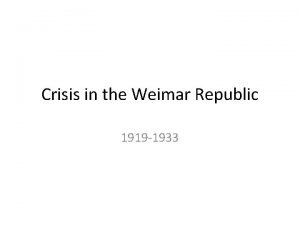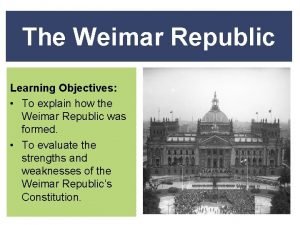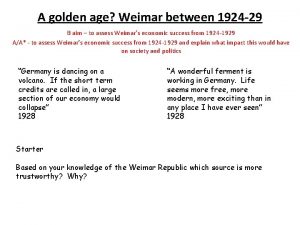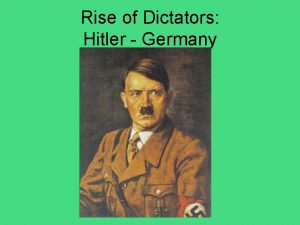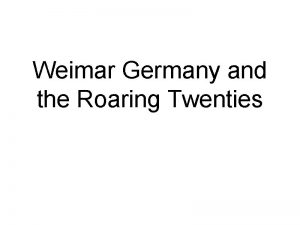WEIMAR GERMANY AND THE RISE OF HITLER 1919


















- Slides: 18

WEIMAR GERMANY AND THE RISE OF HITLER 1919 -1933

You will learn…. . § Why Germany’s new government had so many problems after WWI § How Germany recovered from some of these problems from 1924 to 1929 § How events after 1929 led to the collapse of this government § What Nazism means § Why Hitler and his National Socialist Party came to power by 1933

THE TROUBLED YEARS 1919 - 1923 1. Bad state of economy made things worse 2. Raw materials were under foreign control, Saar and Alsace-Loraine CENTRES OF IRON AND STEEL PRODUCTION 3. Production in mines and factories reduced 4. Led to massive unemployment 5. Shopkeepers and traders suffered as people had less to spend 6. Soldiers were jobless and ended up begging

THE TROUBLED YEARS 1919 - 1923 § Thus did not have enough money to pay for reparations § France was angry and decided to invade the Ruhr, an area in western Germany – centre of the country’s heavy industries COALMINES, IRON AND STEEL WORKS § Aggravated the situation. How?

THE TROUBLED YEARS 1919 - 1923 § German workers went on strike, silently encouraged by the WR § Factories stopped producing goods § Prices went up § Price increase went out of control; value of money fell § Govt response : Print more money § Money became worthless - hyperinflation § People’s savings wiped out § Standard of living dropped drastically

THE TROUBLED YEARS 1919 - 1923 § Many Germans suffered and turned very bitter § Many blamed the government § Led to support for extreme parties from both the right and the left wing § It was during this Ruhr crisis of 1923 that Hitler staged his attempted putsch in Munich

THE TROUBLED YEARS 1919 - 1923 § “Beer Hall” Putsch § Took place in a large beer hall in Munich § 3, 000 Germans gathered there to listen to a speech by the state commissioner of Bavaria § Hitler jumped on a chair and proclaimed, “The national revolution had broken out. ” § The Nazis then held a demonstration march to the centre of Munich § Clashed with the police § Hitler escaped but was later arrested § Sentenced to 5 years jail for treason § Served 9 months in jail before he was released

Price of bread, 163. 15 marks in 1922, went up to 201, 000, 000 marks in 1923 HYPERINFLATION Price of egg , which was just 1. 6 marks in 1921 went up to 320, 000, 000 marks by Nov 1923

Weimar Republic, 500, 000 Mark Note, Series of 1923 Probably the largest denomination banknote ever printed. Source : http: //www. intrepid. net/sabre/ephemera. html

YEARS OF RECOVERY 1924 -1929 § Economy began to recover in mid-1920 s § Thanks to Gustav Stresemann § Who was he? § What did he do?

YEARS OF RECOVERY 1924 -1929 § Gustav Stresemann § First as Chancellor (Prime Minister), then as Foreign Minister for much of 1923 -29 § Wanted Germany to be prosperous again § Sought better relations with other countries § One of his first achievements – persuade the French to withdraw their troops from the Ruhr § Helped to get factories producing again § People could find more work

YEARS OF RECOVERY 1924 -1929 1. France agreed provided Germany paid reparations REASON WHY THEY WERE THERE IN THE FIRST PLACE 2. Streseman agreed but tried to buy time for payment 3. Made a deal with US – Germany would not fall back behind its payments if given more time and loans to help economy recover 4. At the same time, he resolved the currency problem 5. Withdrew all the old money (mark) and replaced it with a new currency (rentenmark) which had proper financial backing 6. Boost people’s confidence in the new currency

YEARS OF RECOVERY 1924 -1929 § Stresemann’s greatest interest was in foreign affairs § Aimed to make Germany the strongest country in Europe again § Plan was to get on better terms with other countries and convince them to trust Germany again § His hope was to recover some of the lands and rights that Germany had lost at the Treaty of Versailles

Stresemann’s successes in foreign affairs § Treaty of Locarno § Signed with Germany’s wartime enemies in 1925 § WR agreed not to try and recover any of its lost lands in western Germany § Helped make Britain, France and Italy less suspicious § Getting Germany into the League of Nations § League of Nations – again controlled by Germany’s wartime enemies § By joining them in Sep 1926, indicate that they were on better terms § Bitter feelings aroused by war subsided

Stresemann’s successes in foreign affairs § Persuading Allies to withdraw their troops from the Rhineland in 1929 § 5 years ahead of the schedule laid down in the Treaty of Versailles § Showed that Stresemann’s policy of gaining trust among other countries worked

Stresemann’s successes in foreign affairs 1. Getting the USA to agree to an even better deal about reparation payments 1. The Dawes Plan 1924 in which USA would invest 40 million pounds in Germany 2. Followed by the Young Plan, made in 1929 3. In return for promising that it would continue to pay reparations, the amount that Germany had to pay was greatly reduced 4. From 6, 600 million pounds to 1, 850 million pounds 5. Spread over 59 annual payments

Effects of Wall Street Crash on Germany § Wall Street Crash 1929 § Brought Germany’s prosperity to a sudden end. How? § Germany had come to rely almost totally on US loans and investments § US economy collapsed in Oct 1929 § American bankers demanded that German loans be repaid § American businessmen withdrew their investments § USA and other countries had less money to buy German goods § Factories closed, leading to unemployment § A vicious cycle; worse than in early 1920 s § German economy collapsed totally

Effects of Wall Street Crash on Germany § Banks closed and inflation was back § More people were out of jobs – 2 million in 1929 to 6 million in 1932 § As in the years after 1919, the people blamed the government again § Started supporting extremist parties § Especially the National Socialist party and their leader Hitler
 Weimar unemployment
Weimar unemployment Weimar germany political spectrum
Weimar germany political spectrum Lesson 3 hitler and nazi germany
Lesson 3 hitler and nazi germany Hitler birth
Hitler birth How did hitler become chancellor
How did hitler become chancellor How did hitler become chancellor of germany
How did hitler become chancellor of germany Tricky dick: the rise and fall and rise of richard m. nixon
Tricky dick: the rise and fall and rise of richard m. nixon Hitler rise to power
Hitler rise to power How did hitler rise to power
How did hitler rise to power Rise and rise until lambs become lions
Rise and rise until lambs become lions Raise and rise again until lambs become lions
Raise and rise again until lambs become lions A union b example
A union b example Weimar republic gdp
Weimar republic gdp Seminarraum weimar
Seminarraum weimar Was the weimar republic doomed from the start
Was the weimar republic doomed from the start Explain image
Explain image Drehrohrofen energiebilanz
Drehrohrofen energiebilanz The golden age of weimar
The golden age of weimar Weimar
Weimar
